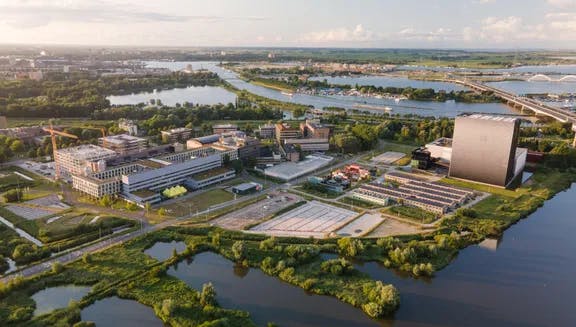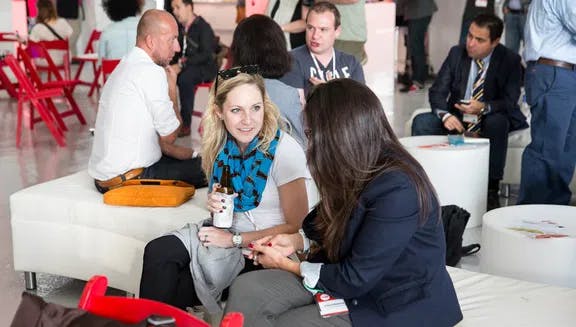
How has Covid-19 impacted the future of Amsterdam’s startup scene?
A startup ecosystem is a revealing thing. Like a petri-dish of society, it reflects the values and problems of people and the planet, with smaller companies being agile enough to respond quickly to a changing world, and new startups popping up in response to the specific needs of our lifestyle. Things can and do move quickly in the startup world, often revealing trends and patterns before the larger corporations can grind their gears into action.
So a year into one of the life-changing events of our times, how has Amsterdam’s startup ecosystem already responded to our fluctuating world and, importantly, what can it tell us about how our lives are adapting? We spoke to some of the ecosystem’s key stakeholders to find out.

Nikky Hofland, Managing Director of TechMeUp
Giovanni Vaccari, Head of Product at Startupbootcamp
Thom Wernke, Co-founder & CEO of StartDock
A resilient ecosystem
Thom Wernke, Co-founder & CEO of startup co-working space network StartDock, works directly with many of Amsterdam’s startups and reports that “80% of our members seem to have gone through Corona quite smoothly - by either working hard, or being creative and entrepreneurial.”
From an uncertain start to 2020, in which Wernke says there was a big decrease in enquiries from international tenants for StartDock’s workspaces, the sector seems to be recovering quickly. “We now see more and more international enquiries in our inbox” he says.
Indeed, initial figures from Q1 2021 show Amsterdam’s startup scene to be robust and resilient against the challenges of the pandemic, with its combined value having hit the 100 billion euros milestone earlier this year - ten times more than in 2015. What’s more, the city is rising in the European rankings and is now rated as the #3 European hub by enterprise value after London and Berlin, for companies founded since 2000. The startup scene may have weathered the storm in general, but it surely isn’t the same place as it was in 2019. So what’s changed?
Acceleration to digital
One thing that the pandemic has universally highlighted is the huge opportunities of digital. Giovanni Vaccari, Head of Product at Startupbootcamp - one of the world's largest startup and scale-up accelerators - says the pandemic “enabled us to use digital as the way forward - because there was no other way. We were seeing for years that things were going digital, and we were prepared, but when the pandemic hit, it was like: ‘this is it, this is where we are headed.’” Vaccari says that the migration to digital has allowed them to provide help to a larger pool of startups through their new online digital-acceleration platform Accelerator Squared, which is available to Amsterdam startups via the Amsterdam Squared portal. “Instead of providing help to 10, we can provide to 100 - just in a different format. Our business model needs to be repeatable and scalable, and digital is such a huge tool to achieve that.”
Another benefit of this dramatic shift to digital in the startup scene is how much faster things can happen. Vaccari explains: “Once you cut down on those infinite meetings where you have to drive an hour there and an hour back, you just have a 15-minute Zoom meeting and decide: are we a match? Are you interested in me? Am I interested in you? It makes so many things easier. We’ve gained speed and agility, and we’ve stopped wasting each other's time.”
New opportunities, and new pathways
Startups often arise out of an unfulfilled need in society, and TechMeUp is no different. This Amsterdam non-profit foundation provides interest-free loans to people who want to reskill in tech, in response to the current skills shortage for these kinds of roles. Nikky Hofland, Managing Director of TechMeUp says that the pandemic affected the company’s strategy, with the focus shifting to help different kinds of people than originally intended, and a shorter roadmap. “The coronavirus wasn’t the reason we started, but it did put some pressure to launch asap. It did accelerate everything. Coronavirus made us run harder.”
In the wake of job loss and unemployment, the pandemic saw many people taking up the opportunity to study online courses, now newly accessible thanks to the shift to online. And the added pressure of the situation pushed people into action. “This crisis forced people to make a decision” says Hofland. “A lot of people were doubting if they should reskill in tech, but when coronavirus happened they thought ‘okay, this is the moment then.’ It opened up doors that were closed before and it made people curious.’’ And curiosity is always a good ingredient for a healthy startup scene.
Hofland also says that coronavirus has highlighted the importance of digital fluency and the pressure to learn these online skills has inspired a broader group of people to get past their apprehensions and dive into digital. “People will have a better understanding of how important it is to be tech savvy. It is not so scary any more,” Hofland says. “My aunt just ordered something from a French webshop and she wouldn’t have done that a year ago. We’re forcing people to do something new and I think it will stick and we’ll see the possibilities."
Growth in sustainable startups reflects people’s changing habits
The pandemic has impacted on every part of our work and home lives – forcing us to rethink the way we are shopping, eating, banking, job-hunting, freelancing, and living. And while Giovanni Vaccari sees fintech, commerce, Smart City and privacy startups on the rise, he says the main growth he has witnessed is in the area of sustainability. “The growth in sustainability has been insane - impact investors are really focusing on that, and seeing that people buy sustainability more. The pandemic gave us a really good look at our consumer habits and our spending habits. For example, people are horrified by how much they shop. Once the consumers are thinking about that, the big corporates start thinking about that too. And startups can move faster than anybody else to adapt to that reality, taking sustainable steps that the corporates can learn from and collaborate with.”
How important is the human touch?
StartDock’s Thom Wernke says that while all the forced separation sparked so many creative digital solutions, it also showed the areas where there simply isn’t an alternative to personal connections. “During Corona I was happy to see the intrinsic social needs of humanity: We need hugs, we need social interaction, we need one-on-one contact instead of always via computer screens,” Wernke says. “Before Corona I often felt humanity was moving towards living through screens and chat-apps, but during corona I was positively surprised to see that devices can not replace human contact. We're social beings and I feel we need to get back to complete social interaction soon, which will immediately bring a lot of opportunities for entrepreneurs in sectors like live events and hospitality.”
Vaccari, at Startupbootcamp, sees a silver lining to the social distancing. “The biggest difference in the startup scene since coronavirus is there is no human touch… for good and for bad," Vaccari says. “You miss the beers at the end of the day where you can bond and share, but now we have a way to go straight to the point, which can be very effective.”
How the pandemic might change our workspace culture
The trend towards more flexible working is something that co-working innovator Wernke is already noticing. “We have had quite some interest from companies that scaled down from their own (larger) office floors to a co-working environment, which was a new experience for us. We have also seen a large growth in single-worker universal co-working-passes and platforms, like Desana, Coworker and Croissant. These companies cater to the needs of large organisations that will move into a hub & spoke model after the pandemic, which I think will be a big trend soon.”
Wernke says that, while people will work at home more often, and many meetings will continue to be held virtually, office environments will take on a new role post-pandemic - catering to the vital social needs of human beings. “Although Corona temporarily impacted a lot on our working habits, I also think the added value of an office shouldn't be underrated. A lot of employers will want their teams to return to the office - especially the employers that build on a corporate brand identity. Employers will offer more flexibility, but they will keep HQs and office space. Productivity-wise I think it's a blessing when employees can choose where to work from, since people can pick the right environment for the type of work you have to do that day.”
How might Amsterdam’s startup scene change over the next five years?
“We’ve got to think about what we’re gaining here, and how we can exploit those gains for everyone’s benefit” says Vaccari, who sees a higher adoption of digital, more understanding of remote work and a continuation of the upwards growth in startup companies coming out of the Netherlands. “There is the chance for the startup ecosystem to become more egalitarian, profitable, prosperous, diverse and sustainable - and we’re finding ways to connect to each other that wouldn’t happen otherwise.”
For Nikky Hofland, it’s all about more accessible training and education. “Education will become more blended, more hybrid, with online and offline elements. We will go back to offline again but the digital part will be bigger and more scalable, and they will accept more people - and different types of people. People who previously could not access education due to physical distance or lack of financial resources will now have more avenues to reskill. ”
StartDock’s Thom Wernke sees a landscape of new possibilities. “I'm proud of our species. Throughout coronavirus, we've helped and supported each other," he says. “With the bright entrepreneurial minds of the Dutch startup ecosystem working together, we will come out of this crisis even stronger.”
Related articles

International hiring and working remotely

How do you know if you’re ready to scale up?

Amsterdam in international rankings

#FoundersFridays: Meet Anieke Lamers

City data

How Amsterdam’s startups are using AI to make the world a better place

10 reasons startups choose and love Amsterdam
